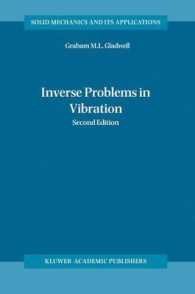- ホーム
- > 洋書
- > 英文書
- > History / World
Full Description
Over the course of the early Middle Ages, Christianity changed politics and politics changed Christianity. Christianity emerged in the pagan Roman Empire and early Christians, consequently, developed a 'secular' understanding of politics, where the religious identity of their ruler was irrelevant; by the time the synthesis of early medieval Christianity was achieved in the ninth-century Carolingian Empire, however, a new model of 'Christian kingship' had emerged, linking the legitimacy of a ruler to the quality of their Christianity. Conor O'Brien traces the slow, complex, and only ever partial way in which the concept of 'Christian kingship' arose in the Latin West over the five centuries up to 840.
Taking a comparative approach that is sensitive to regional variation and the interconnected nature of the post-imperial Latin West, the book presents a novel overview of the transformations of both religion and politics in the early Middle Ages. Drawing on recent anthropology and global history approaches to sacred kingship, it takes seriously both continuity and change over time to show how the relationship between early medieval Christianity and kingship was, above all, driven by people's search for good government. Christian kingship arose in societies where it proved a useful mechanism for addressing the relationship between the ruler and the ruled. In doing so, The Rise of Christian Kingship in the Early Medieval West provides not just a rich reconstruction, grounded in the primary evidence, of changes in political thought and practice in the early Middle Ages, but also contributes to wider historical discussions about secularity, sacred kingship and the relationship between politics and religion.
Contents
1: Introduction
2: In the Shadow of Empire: Until c.450
3: The Heretic Kings: c.429-c.540
4: The Two Cities: Rome and Constantinople, c.450-c.750
5: The Long-Haired Kings: The Merovingian Realms c.481-c.700
6: A Most Christian Kingdom: The Visigothic Realm, c.450-711
7: The Ends of the Earth: The Insular World, c.450-c.750
8: The Carolingian Moment: c.718-800
9: Imperium Christianum: c.775-c.840
10: Conclusion: Vox Dei, Vox Populi







